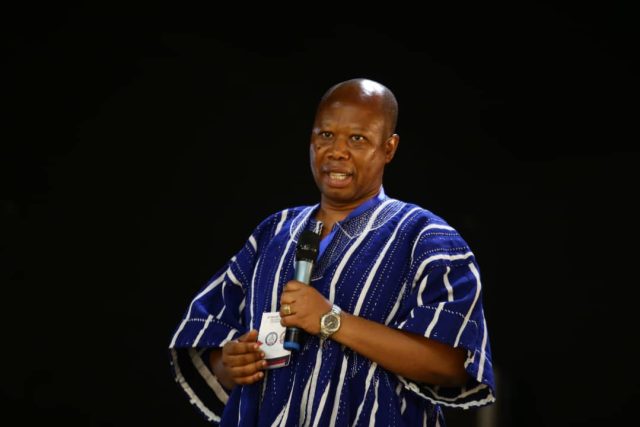Dr Theophilus Senyo Ackorlie, Finance Officer of the University of Education, Winneba (UEW), has advocated prioritization of higher education in the national budget.
This he stated will involve the allocation of significant portion of the budget to the funding of public and technical universities to enable them to have the requisite resources to provide quality graduate studies.
Dr. Ackorlie made the call in a presentation he delivered at the Second Seminar organised by Graduate Students of the School of Business of the University, aimed at bridging the gap between theory and practice.
The event under the theme “the implication of Ghana’s Debt Exchange Programme (GDP) on Academia and Postgraduate students”, was attended by a number of graduates students from other Faculties, Lecturers and Heads of Departments of the University.
Dr. Ackorlie who was the guest of honour, said another alternative strategy for Government to consider was to engage the private sector in funding graduate studies.
According to him this could be done through the establishment of endowments, public-private partnerships as well as other initiatives that will encourage corporate social responsibility, saying the private sector must be assured of supply of required Human Resources/Skills from the universities.
Ghana could also attract research grant from international agencies to fund graduate studies by setting up strong research institutions to attract foreign researchers to collaborate with their local counterparts for effective work to lead in the development and growth of the country.
He further advocated for the establishment of scholarship programmes by the government to support graduate students who were unable to pay for their education, adding that such scholarship programmes could be supported by the private sector and other development partners to supplement what the Scholarship Secretariat was now doing.
“To ensure that graduate studies in Ghana meet International Standard, there must be a focus on curricula development, which must be updated regularly to meet the changing needs of the job market and ensure that graduates have the necessary skills to contribute to national development”.
The Finance Officer schooled them on topics such as the composition of Ghana’s Debt, Government Bond, Government Bonds as risk-free securities, Risk-free rates; its uses in Financial Models and Does the Risk-free Rate really exist?.
Others were, Bond pricing, DDEP and Haircut, Ghana’s DDEP, Background to Ghana’s Debts, Why DDEP, Legal Frameworks, Regulatory Framework, Ghana’s Current Debt Situation and DDEP; Implications for Higher Education.
On Grants and Resources Funding; he stated that Public Universities could also secure funding through grants and research funding to be used to support research initiatives, academic programmes, and other university initiatives.
He finally suggested that alumni should be encouraged to give back to their alma mater as an effective way to raise funds for universities through targeted funding campaigns and other outreach efforts.
As part of the seminar, Prof. Awaisu Imurana Braimah, Dean of School of Business in a presentation on the topic: “Why enroll on UEW, School of Business Graduate Programmes” gave a brief history of the school of business which was established in September 2017.
According to him it was originally commenced as a department of business education under the faculty of Social Science Education in 2010/2011 academic year offering only two academic programmes (Accounting and Human Resource Management).
He stated that currently three additional programmes: Marketing, procurement and Supply Chain management and Banking and Finance have been included to the existing courses.
The Mission of UEW School Business, he noted was to train competent practitioners in business and management to be well-suited for the corporate world to conduct teaching, research, and community service and to promote business education policies.
Prof. Victor Antwi, Pro-Vice Chancellor of the University spoke on the topic “Graduate Students Thesis writing, Supervisions and Assessment; the role of Supervisors, Assessors and the Graduate students.”
He urged the supervisors to ensure that preparation and submission of thesis within the student’s funded period were done for research projects to be fully completed while students were advised to work within time.
Prof. Samuel Kwesi Asiedu-Addo who chaired the event applauded the organizers for championing the course to help bridge the gap between academia and industry.
















